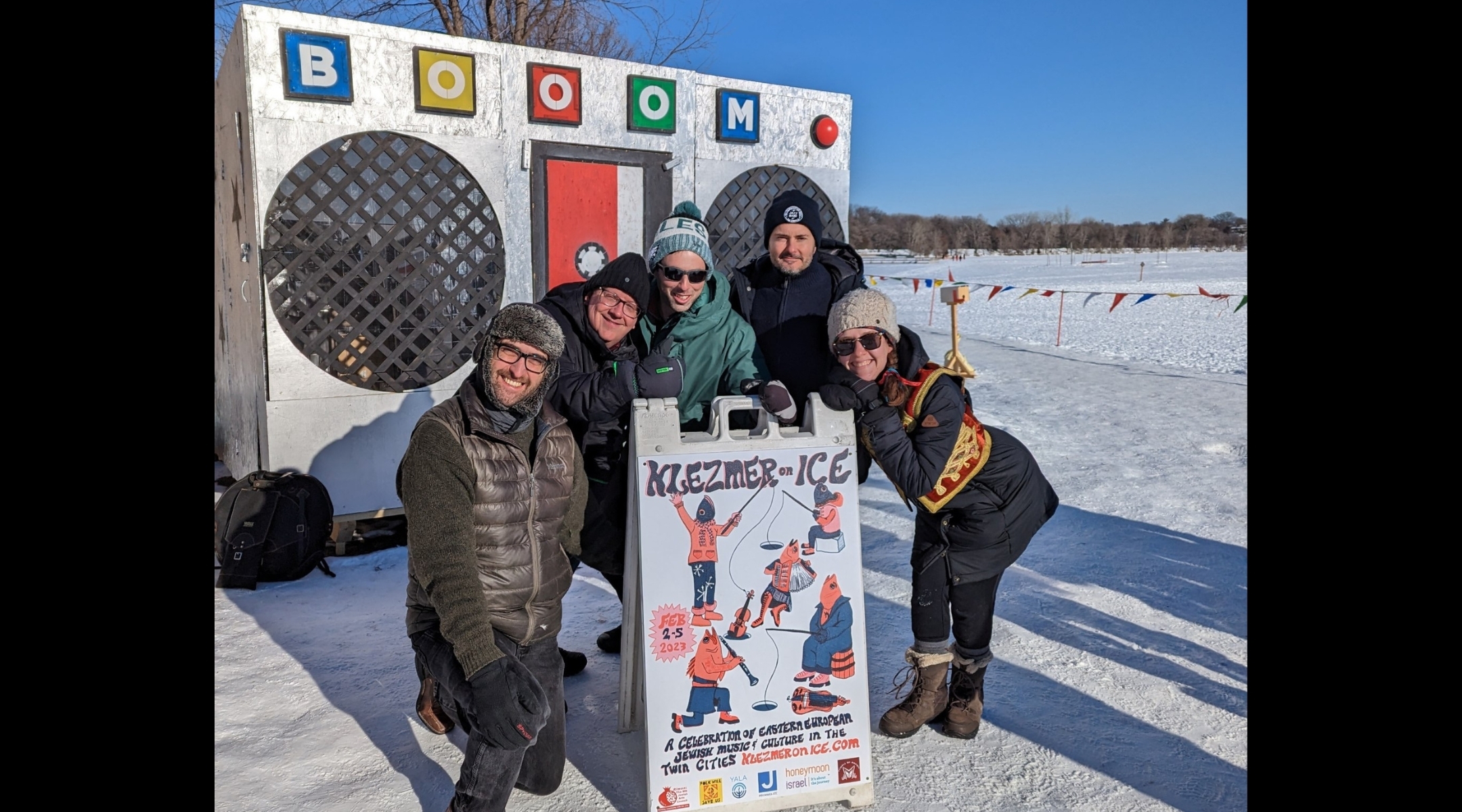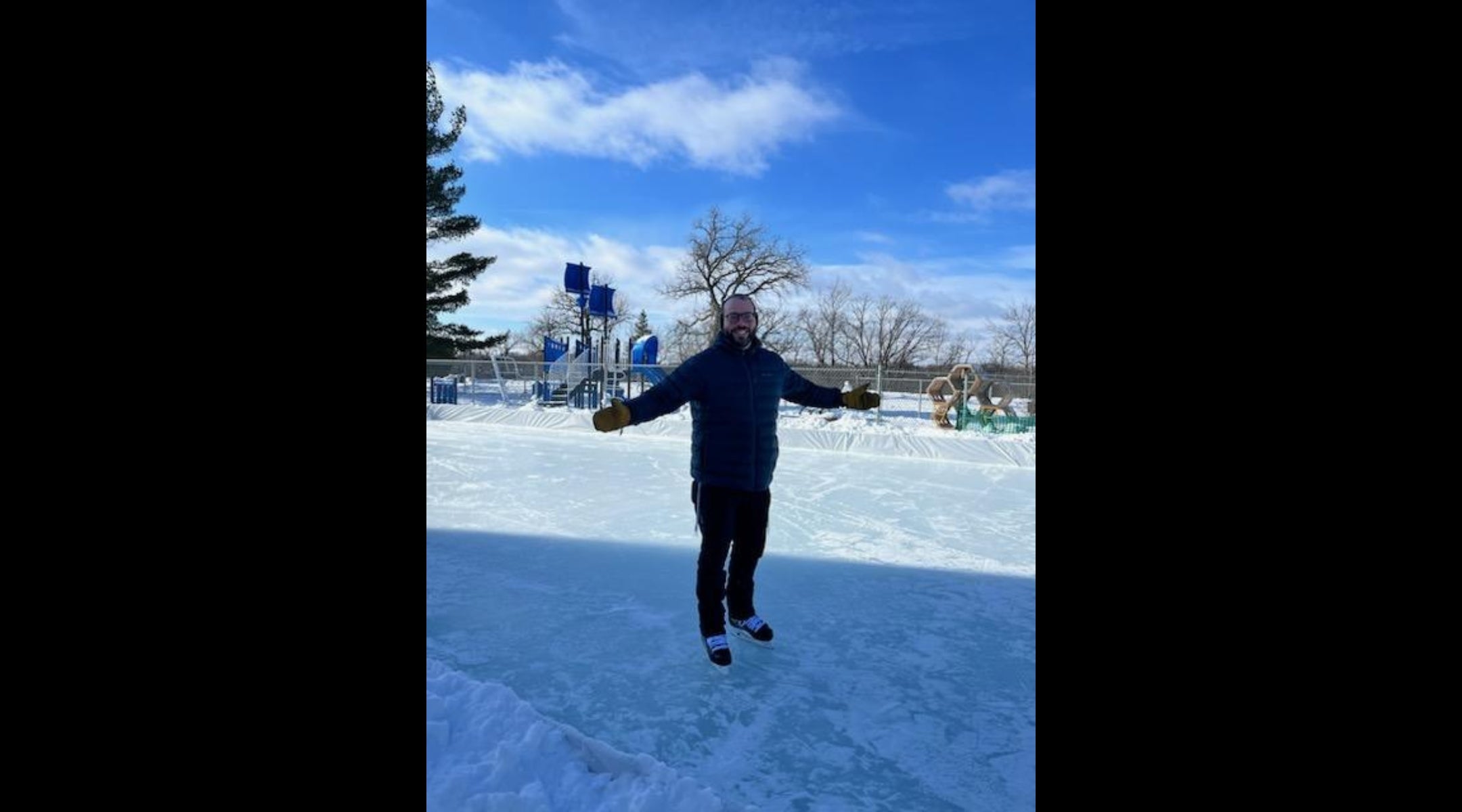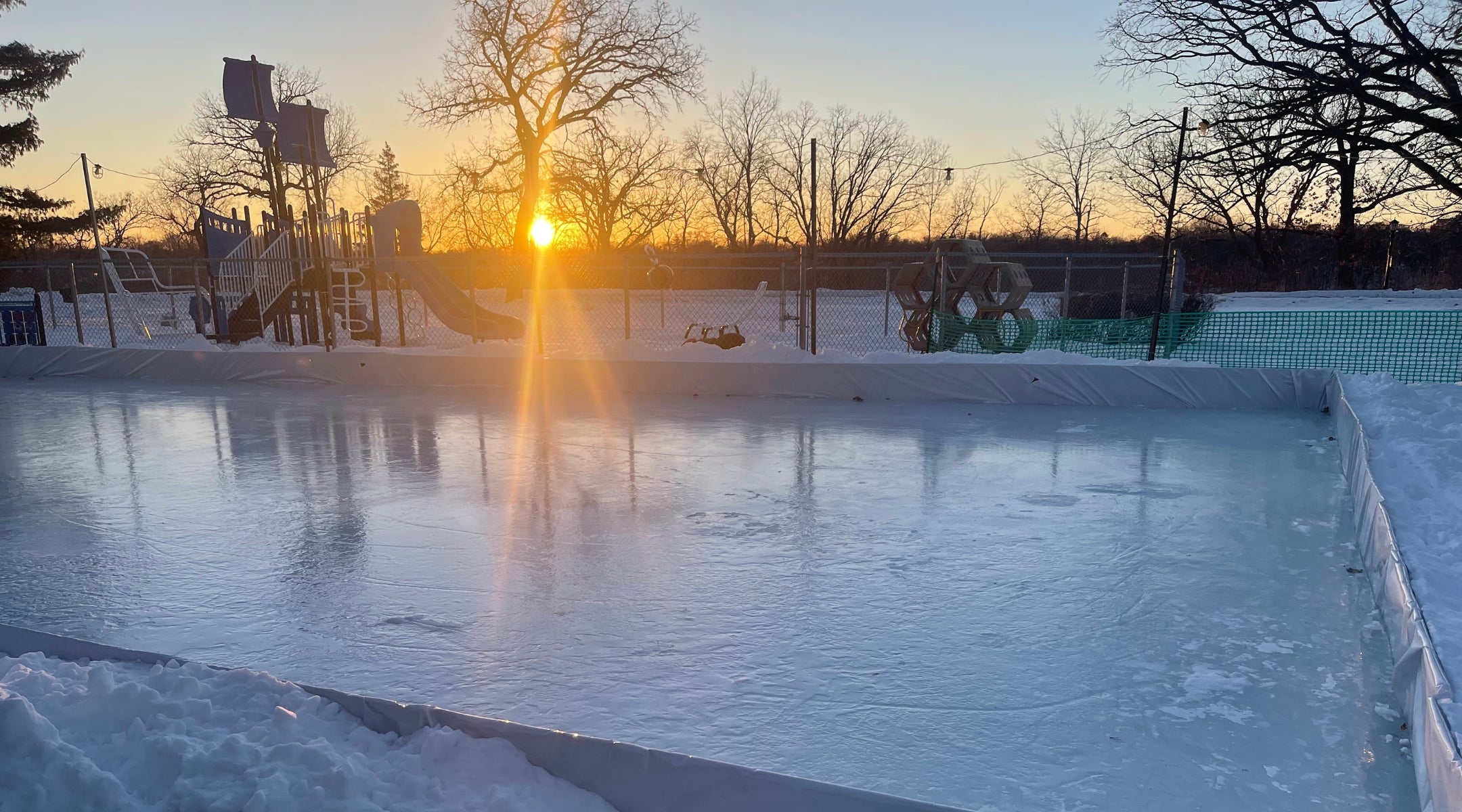A Minnesota synagogue built an ice rink — and is inaugurating it with a klezmer skate
It’s so cold that instruments are freezing up at the Twin Cities’ Klezmer on Ice festival

From left to right: klezmer musicians Greg Schweser, Pat O’Keefe, Josh Rosard, Michael Leville, and Sarah Larsson pose for a picture in front of the Art Shanty popup in Minneapolis. (Courtesy of Josh Rosard)
(JTA) — A forecasted low of -16 degrees in the Twin Cities on Thursday has the stage set perfectly for two frozen Jewish firsts — a Klezmer on Ice festival and a synagogue-run skating rink.
Such is life in Minnesota, where bone-chilling temperatures are no match for Jewish festivities.
“It kind of shows us the Minnesota-style of thinking about the winter where just because it’s freezing cold outside, you don’t have to stop doing everything,” said Marcus Rubenstein, rabbi at Temple of Aaron in St. Paul.
“I used to be a rabbi in New York. They said you couldn’t schedule any big events in the winter because no one would come in case it snowed,” Rubenstein said. “But [here] sometimes it will snow 6, 7 inches and be -5, -10 degrees, and you’ll have everybody come out. I mean people in their 80s, 90s to little kids. And they just put on their coats and go out and have fun.”

Rabbi Marcus Rubenstein of Temple of Aaron test drives his synagogue’s new ice rink. (Courtesy of Marcus Rubenstein)
Temple of Aaron, a Conservative congregation of about 700 families, is inviting families to bundle up and have fun on what Rubenstein believes is the first-ever skating rink on a synagogue property.
The rink, which can accommodate about 30 people at a time, was built by congregant Joel Paper and is being maintained by “Ice Captains” — synagogue members who clear it of snow and shovel off any extra ice that forms.
On Thursday, skaters at the rink heard the kickoff performance of the klezmer festival, featuring Jewbalaya, a hybrid klezmer and New Orleans jazz band in which Rubenstein plays the trumpet.
But the music will be piped in from inside the synagogue — a concession, Rubenstein and others associated with the festival said, to the cold.
Last week, musicians promoting Klezmer on Ice with a pre-festival performance alongside Lake Harriett, the (usually frozen-over) body of water at the heart of Minneapolis, ran into some technical challenges. Anticipating frigid temperatures, the musicians planned to play from a lakeside booth decorated like a boom box as part of a pop-art initiative called Art Shanty. But there was a wrinkle.
“We were supposed to have a sousaphone player who by the time they got their heavy big brass instrument into the box, the valves were frozen so they couldn’t play,” said Josh Rosard, an organizer of Klezmer on Ice. The performance went on without the sousaphone.
It’s not just brass instruments that are vulnerable to cold snaps. Strings and woodwinds can quickly go out of tune in the cold, as metal contracts and wood begins to warp. Clarinets and violins, staples of the Eastern European Jewish music genre, just can’t take it.
That’s why most of the Klezmer on Ice events will take place indoors — including but not only at Temple of Aaron. On the schedule for the weekend-long festival are local and national performers Sarina Partridge, Tzipporah Johnson, Izzy Buckner, the Klezmommies and the band Midwood. There will also be a cabaret variety show; klezmer-infused Shabbat services; and a luminary Havdalah ceremony.
Rosard said he saw the event as a breakout moment for the Twin Cities’ klezmer scene and, given the strong track record of longstanding klezmer festivals at spawning new acts, an opportunity.
“I’m really excited for what players in the community are going to take out of the workshops in particular and excited to see what may come out of it in the future,” said Rosard, who grew up casually playing the accordion but got more seriously involved in the klezmer world during the pandemic. He met his Klezmer on Ice co-organizer, Jewish musician and folklorist Sarah Larsson, with whom he attended KlezCanada and the Portland Klezmer Festival.
Still, he acknowledged, “It’s a little bit tongue in cheek to do something like this in the middle of February in Minnesota.”
Rubenstein said his congregants are up for it. Temple of Aaron’s new ice rink will be open not only during the klezmer festival’s opening night but for skating sessions most Saturdays after Shabbat morning services and Hebrew school classes finish.

The sun sets ahead of the Klezmer on Ice Festival’s opening night, which features a free skate session at Temple of Aaron’s ice rink. (Courtesy of Marcus Rubenstein)
If the activity isn’t exactly standard after-synagogue fare, it’s perfectly permitted under the Conservative movement’s interpretation of Jewish law. The movement, of which Temple of Aaron is a part, permits non-competitive ice skating on Shabbat, so long as no Shabbat rules are violated (such as driving to or from a rink or paying to rent skates), and the skating takes place within the boundaries of an eruv, or Jewish legal enclosure inside which certain objects can be carried on Shabbat.
Rubenstein said he was thinking about the activity in different terms — as it relates to making Temple of Aaron a centerpiece of a St. Paul Shabbat.
“The kids are ice skating anyway,” he added. “So why not ice skate at shul and come do it together with their Jewish friends, and build community that way?”
Temperatures are supposed to rise over the course of the weekend, but the high on Friday should be in the low single-digits. So for the klezmer performance that is supposed to take place at Lake Harriet, Rosard says, a plan is in place to avoid last weekend’s snafus.
“We’ll have the sousaphone player drive up as close as possible, then run-slash-briskly walk straight into the performance shelter,” he said. “We didn’t quite have the urgency last time.”
This article originally appeared on JTA.org.
Correction: A previous version of this article stated that the “Ice Captains” built the rink; the rink was actually built by one congregant, while the “Ice Captains” maintain it.















